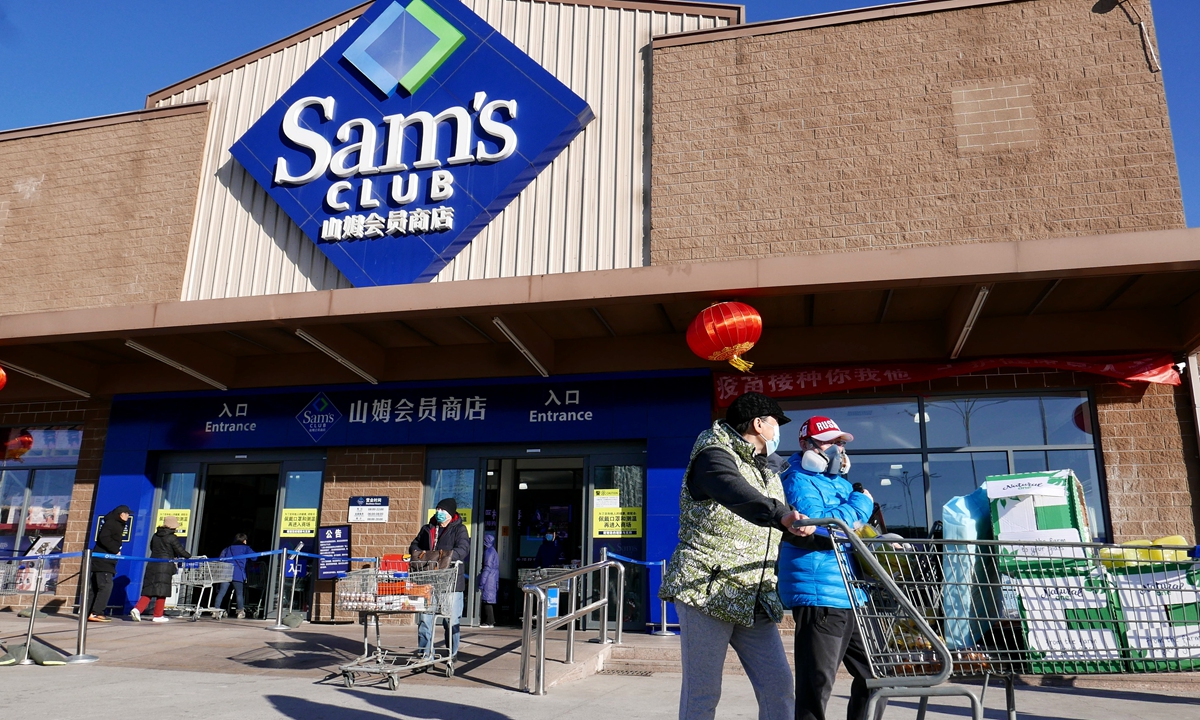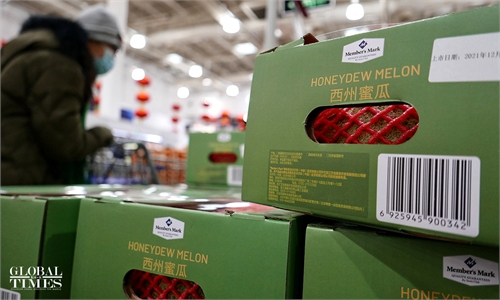
Sam's Club store in Yizhuang area of Beijing Photo: Li Hao/GT
Chinese consumers' anger toward US supermarket brand Sam's Club are fermenting further, as they moved to cancel their memberships, in large numbers in certain cities, at the high-end membership store of Walmart, which has been found to have removed certain products from Northwest China's Xinjiang Uygur Autonomous Region.This wave of membership cancellations is taking place in multiple cities in China, including Xiamen, Hangzhou and Ningbo, with pictures and videos circulating on China's twitter-like Weibo showing people in long lines at Sam's Club stores to return their membership cards, according to media reports.
Sam's Club is facing a backlash from Chinese customers after the firm apparently moved to rid their shelves of products that were made with parts from Xinjiang, following the US government's action to ban imports of all products made from regions with so-called forced labor.
The Global Times searched for products related to Xinjiang in Sam's app and found no results.
Several people told the Global Times that they had applied to cancel their memberships at the supermarket, as they felt offended by the company.
"They reject Xinjiang, and I reject them," said one Shanghai customer surnamed Zheng. He cancelled his card a few days ago and vowed that he would not take one step into the store again, even if Sam's Club puts Xinjiang products on its shelves again or makes an apology at some point in the future.
"If overseas companies want to make money in China, they should abide by Chinese rules honestly," he told the Global Times on Wednesday.
Chen Miao, a 25-year-old teacher at a local training center for language learning in Southwest China's Chongqing, told the Global Times on Wednesday that she planned to suspend her about six-year-old membership at Sam's, after she saw reports about the retail giant removing Xinjiang-related products.
"This reminds me of the last incident when some foreign companies boycotted Xinjiang cotton, which is just another typical example of the US unilaterally cracking down on the Xinjiang economy and the Chinese economy, " Chen said.
She noted that she would not consider resuming the membership one day as this retail chain can be replaced by many other supermarkets.
Another consumer in Kunshan of East China's Jiangsu Province surnamed Li said she was angered by the store's decision to remove Xinjiang products and will consider cancelling her membership soon.
"Sam's Club is behind other supermarkets like Hema in my choices, as I find some problems with the supermarket, including that its frozen food is not very fresh, and its food ingredients are not natural/healthy enough.
"Now that it has removed Xinjiang products, my impression of the store is even worse," she told the Global Times.
A Global Times reporter visited one Sam's Club store in Shanghai and found no products were being sold that were produced in Xinjiang. In particular, neither the cantaloupes nor grapes, popular Xinjiang specialties, were being sold.
A salesperson in the store told the Global Times that it used to sell Xinjiang cantaloupes, but wouldn't sell them now. She said she was not sure about the reason.
However, there were only two people applying to cancel their memberships when the Global Times visited, and one of them said that he decided to cancel the membership because the store is too far away from his home.
In total, Sam's Club has 27 stores in 20 domestic cities, the shop's official website showed.
The Global Times also visited a Walmart store in Beijing and found that some products from Xinjiang are still being sold in the shop. For example, a melon produced in Hami City, Xinjiang, named "28 Degree Northern Latitude" is being sold in the store.
Some clients also opted not to draw a line with the retailer as they still have a need for the shop's goods.
An anonymous Sam's Club user from Shanghai told the Global Times on Wednesday that she decided not to quit her membership, as the process is too complex, and she still has a demand for the supermarket's goods.
"I saw the reports that Sam's Club removed products from Xinjiang in the search trend of Sina Weibo, but I'm not clear about the cause and effect, therefore I decided not to follow the others," she said.
Dong Shaopeng, a senior research fellow at the Chongyang Institute for Financial Studies at Renmin University of China, said that it's a "tragedy" that US companies would follow political orders that are based on totally "groundless" allegations.
"Overseas companies might get away with such disrespectful action for a time, but when they repeatedly trample on local customers' emotions and principles, their business will face a severe blow in the end," he told the Global Times.

